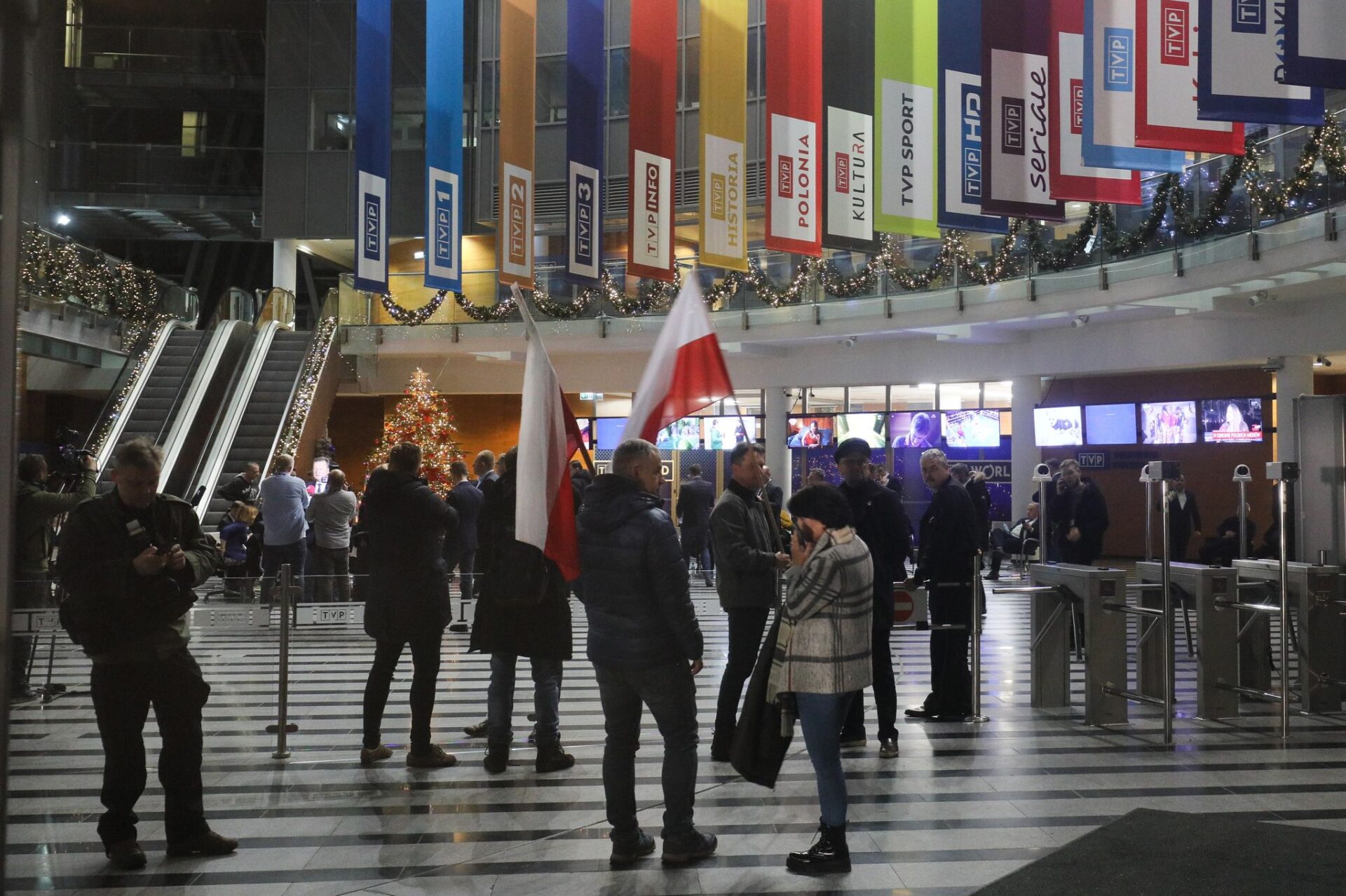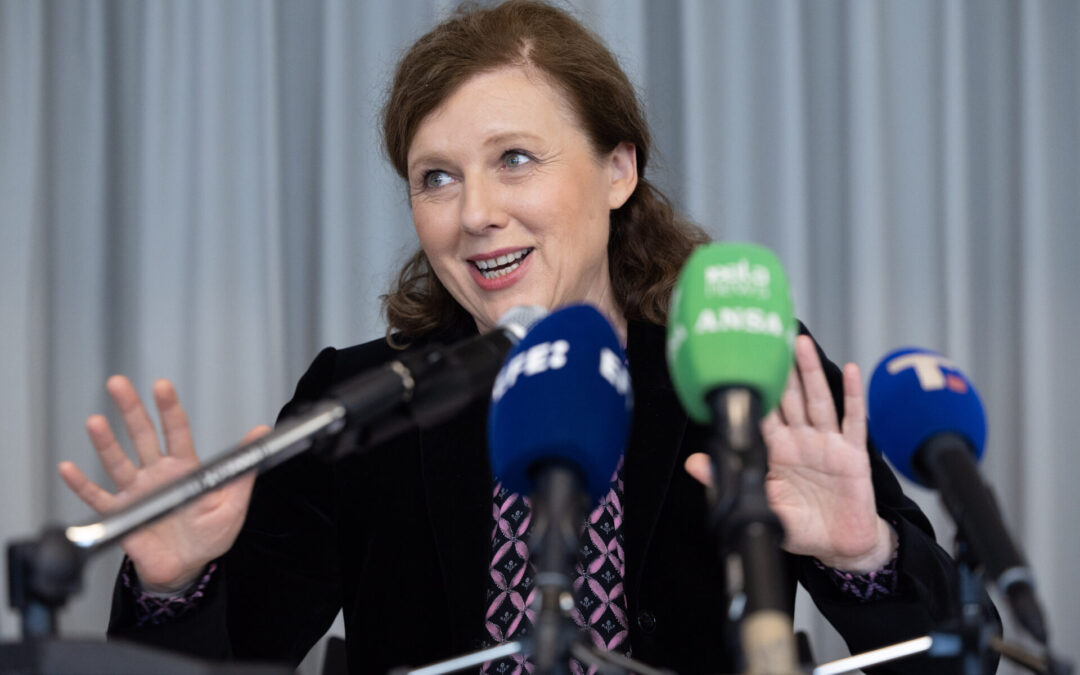 Have the article read by OpenAI (Beta). Please note that AI translations may take some time to process.
Have the article read by OpenAI (Beta). Please note that AI translations may take some time to process.The EU has sealed an agreement on new legislation relating to freedom of the media, which seeks to increase transparency on the ownership of media companies and on institutional advertising, to better protect journalists and their sources as well as to strengthen the independence of public media.
Especially in countries such as Hungary and Poland, where the state has a direct influence on the media, the EU believes that this has become a major problem in recent years. It wants to remedy this with the new legislation.
“The agreement reached […] is a testament to our commitment to fostering free and pluralistic media. For the first time, there will be safeguards in European law,” German MEP Sabine Verheyen (EPP), who spearheaded the text through parliament, said.
Věra Jourová, vice president of the European Commission for values and transparency, said the EU was “not regulating the media, we are regulating the space for media”.
German newspaper and magazine publishers, however, maintained a previously critical stance. The Federal Association of Digital Publishers and Newspaper Publishers (BDZV) and the Media Association of the Free Press (MVFP) said that “while the press is struggling with economic, regulatory and competitive challenges, the EU is tightening a corset that does not address any of the problems and instead endangers press freedom”.
Use of spyware at the heart of the debate
The major stumbling block that caused the negotiations to extend into the final weeks of the Spanish presidency of the Council of the EU was the inclusion of a clause that would have opened up the ban on spying on journalists or their sources for reasons of “national security”, an article rejected by the European Parliament.
According to the agreement, the EU member states must guarantee effective protection for journalists in future. In particular, spying on journalists is to be prevented. However, there could be exceptions to this.
Several member states had previously insisted on allowing exceptions to the spying ban in the name of national security, causing great concern among professional associations and other press freedom advocates. In the end, the compromise text no longer included a reference to national security, Romanian MEP Ramona Strugariu (Renew) said.
After intense “lobbying” by press associations and a battle that threatened to derail the negotiations, the law does not include this exception but reserves it to a recital and makes a general mention of “respecting the responsibilities of the Member States”, sources close to the negotiations said. The European Parliament considered it a victory.
Verheyen said any surveillance, such as the use of spyware in journalists’ devices, would only be possible for serious crimes and if there was a judicial decision. “Not just for everything they can call national security,” she said.

European media landscape in perpetual crisis
The media freedom law also contains some safeguards to protect the independence of public media, such as the requirement that the criteria for appointing and dismissing senior positions, the duration of their mandates and sufficient funding to fulfil their mission must be established by law in advance.
In Slovenia, for example, a long-awaited media reform bill is currently in public consultation. An important new feature is the transparency of ownership, which should also lead to stronger media pluralism. In an interview with TV Slovenia, Minister of Culture Asta Vrečko stressed that the bill follows both the European Media Freedom Act and the Artificial Intelligence Act, which will underpin media regulation in the future.
Despite the agreed safeguards, the media landscape in several other EU countries has recently seen significant transformations.
Poland’s new pro-EU government on Wednesday launched a reform of state media and sacked their management, as right-wing lawmakers staged a sit-in to protest the changes and public broadcasts were interrupted. The shakeup comes a week after the election of Prime Minister Donald Tusk and after eight years of rule by the right-wing Law and Justice (PiS) party. State-owned media under the PiS were regularly accused of biased reporting, transmitting government propaganda and launching verbal attacks on the opposition.
Swiss media company Ringier – which owns Romania’s Libertatea daily and the Gazeta Sporturilor (GSP) publication – earlier this month announced plans to cut jobs at Libertatea, citing the increasing shift to online media. Journalists of the affected dailies claim to have been pressured by management into submitting any articles on online betting companies – who are powerful in the Balkans and are a major source of ad revenues – for vetting ahead of publication.
Commenting on the agreed EU media freedom law, the chairperson of the EU Affairs Committee in the Chamber of Deputies of the Romanian Parliament, Stefan Musoiu, recalled that in Romania, freedom of expression and a free press came about with the 1989 Revolution, following supreme sacrifices that allowed the people to benefit from increasingly promising prospects within the EU and NATO.

Tighter grip on online platforms
Another crucial point in the legislation is the issue of moderation of journalistic content by online platforms. There should also be clearer rules for the relationship between media companies and large online platforms such as Facebook, which belongs to the Meta group, or Google.
The European Commission has decided to open an infringement procedure against social media platform X and its owner Elon Musk – an unprecedented investigation, the first under the new Digital Services Act (DSA). It will look at all the illegal practices the tycoon may be responsible for, including misleading design and serious gaps in transparency. In October, the Commission warned X that there is no room in Europe for illegal content and disinformation on social media.
Meeting with representatives of Reporters Without Borders in Brussels in October, Bulgarian Prime Minister Nikolay Denkov said among the main problems in Bulgaria is misinformation and not the lack of freedom of speech, as there has been significant progress in this respect in the last couple of years. “Apart from changes in Bulgarian laws, European legislation can help us a lot in this respect,” Denkov added.
EU services will now proceed to gather evidence, conduct interviews and carry out inspections before deciding whether to ask X for new remedies or to find the path of compromise. There is no fixed deadline for the investigation under the DSA.
Last but not least, the agreed media freedom law also provides for the establishment of a new European Media Council, made up of representatives of the national regulatory authorities of the 27 EU Member States, to provide a stricter framework for mergers in this sector. This body would be responsible for issuing a non-binding opinion on these operations from the point of view of their effect on pluralism.
The draft European Media Freedom Act will become law once formally adopted by the European Parliament and member states. EU countries can introduce stricter or more detailed national rules than those in the law.
This article is published weekly. The content is based on news by agencies participating in the enr.
